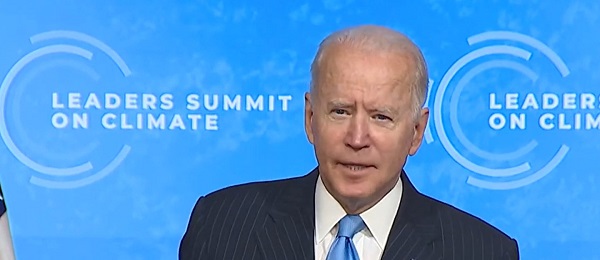Business
Biden-Harris Admin Reportedly Backs Off On Major Emissions Initiative At UN Climate Summit

 From the Daily Caller News Foundation
From the Daily Caller News Foundation
By Nick Pope
The Biden-Harris administration is quietly backing away from a plan to use the ongoing U.N. climate conference to announce an international call for emissions reductions, according to Politico.
It is not clear whether it is because President-elect Donald Trump decisively won last week’s presidential election, but Biden-Harris officials reportedly intended to partner with several other countries in announcing “ambitious” carbon emissions reduction goals for 2035 before the announcement fell through, according to Politico, which cited a draft press release it obtained and several unnamed officials. Had it not fallen through, the announcement could have gone live as early as Monday, the first day of the conference — commonly referred to as COP29 — in Azerbaijan, a Caucasian petrostate with a questionable human rights record.
The aborted call to action would not have been legally binding, though it would have served as a signal to corporations to invest in emissions reduction initiatives and pave the way for other nations to get on board, according to Politico. The countries that would have been named in the announcement would have committed to slashing emissions across nearly every sector of their respective economies, and they would have taken aim at specific chemicals like carbon dioxide, methane and nitrous oxide.
The press release announcing the commitments “clearly won’t be published” at this point, one senior foreign diplomat told Politico, which granted the source anonymity to speak freely on the matter. Beyond Trump’s victory, other potential factors that may have interfered with the plan to roll out the 2035 targets include ambivalence from potential partners or bureaucratic logjam in the European Union, an American ally that typically collaborates on similar climate targets.
The U.S. circulated the idea of putting out a statement ahead of COP29 with “a lot of parties but never pushed for it to become something more,” a European official involved in climate negotiations told Politico.
Trump’s pending return to the White House is looming large at COP29, given the president-elect’s pledges to roll back green spending, regulations and initiatives and jack up fossil fuel production, according to CBS News. Moreover, Trump has also promised to withdraw again from the U.N.’s Paris Climate Accords, which he did in his first term before the Biden-Harris administration rejoined the deal.
The White House did not respond immediately to a request for comment.
Artificial Intelligence
Google denies scanning users’ email and attachments with its AI software

From LifeSiteNews
Google claims that multiple media reports are misleading and that nothing has changed with its service.
Tech giant Google is claiming that reports earlier this week released by multiple major media outlets are false and that it is not using emails and attachments to emails for its new Gemini AI software.
Fox News, Breitbart, and other outlets published stories this week instructing readers on how to “stop Google AI from scanning your Gmail.”
“Google shared a new update on Nov. 5, confirming that Gemini Deep Research can now use context from your Gmail, Drive and Chat,” Fox reported. “This allows the AI to pull information from your messages, attachments and stored files to support your research.”
Breitbart likewise said that “Google has quietly started accessing Gmail users’ private emails and attachments to train its AI models, requiring manual opt-out to avoid participation.”
Breitbart pointed to a press release issued by Malwarebytes that said the company made the changed without users knowing.
After the backlash, Google issued a response.
“These reports are misleading – we have not changed anyone’s settings. Gmail Smart Features have existed for many years, and we do not use your Gmail content for training our Gemini AI model. Lastly, we are always transparent and clear if we make changes to our terms of service and policies,” a company spokesman told ZDNET reporter Lance Whitney.
Malwarebytes has since updated its blog post to now say they “contributed to a perfect storm of misunderstanding” in their initial reporting, adding that their claim “doesn’t appear to be” true.
But the blog has also admitted that Google “does scan email content to power its own ‘smart features,’ such as spam filtering, categorization, and writing suggestions. But this is part of how Gmail normally works and isn’t the same as training Google’s generative AI models.”
Google’s explanation will likely not satisfy users who have long been concerned with Big Tech’s surveillance capabilities and its ongoing relationship with intelligence agencies.
“I think the most alarming thing that we saw was the regular organized stream of communication between the FBI, the Department of Homeland Security, and the largest tech companies in the country,” journalist Matt Taibbi told the U.S. Congress in December 2023 during a hearing focused on how Twitter was working hand in glove with the agency to censor users and feed the government information.
If you use Google and would like to turn off your “smart features,” click here to visit the Malwarebytes blog to be guided through the process with images. Otherwise, you can follow these five steps courtesy of Unilad Tech.
- Open Gmail on Desktop and press the cog icon in the top right to open the settings
- Select the ‘Smart Features’ setting in the ‘General’ section
- Turn off the ‘Turn on smart features in Gmail, Chat, and Meet’
- Find the Google Workplace smart features section and opt to manage the smart feature settings
- Switch off ‘Smart features in Google Workspace’ and ‘Smart features in other Google products’
On November 11, a class action lawsuit was filed against Google in the U.S. District Court for the Northern District of California. The case alleges that Google violated the state’s Invasion of Privacy Act by discreetly activating Gemini AI to scan Gmail, Google Chat, and Google Meet messages in October 2025 without notifying users or seeking their consent.
Business
Is affirming existing, approved projects truly the best we can do in Canada?

From Resource Works
For major projects, what is old is new again
Prime Minister Mark Carney’s second wave of “nation-building projects” sounds transformative: six new energy and mining proposals, plus a northern corridor, added to the first tranche unveiled in September, and included in the freshly passed federal budget for the fiscal year.
Together, Ottawa says, they amount to more than $116 billion in investment and are central to “realizing Canada’s full potential as an energy superpower.” That is the pitch in the federal news release.
Look closely, though, and a different picture emerges. For major projects, what is old is new again. Almost every file now being “fast-tracked” was already on the books, sometimes for a decade or more.
The new referrals to the Major Projects Office (MPO) are all familiar: the Nisga’a-led Ksi Lisims LNG terminal on B.C.’s north coast; BC Hydro’s North Coast Transmission Line; Canada Nickel’s Crawford project near Timmins; Nouveau Monde Graphite’s Matawinie mine north of Montréal; Northcliff’s Sisson tungsten project in New Brunswick; and the Inuit-owned Iqaluit Nukkiksautiit hydro project in Nunavut. The “Northwest Critical Conservation Corridor” in B.C. and the Yukon is added as a long-range concept.
Long timelines and longstanding obstacles
None of these is a fresh idea. As the Globe and Mail notes in a project-by-project rundown, Ksi Lisims has been in development for years and already faces two Federal Court challenges from nearby First Nations and opposition from Wet’suwet’en hereditary leaders who fought Coastal GasLink. The North Coast Transmission Line was identified in 2023, with B.C. legislation to fast-track it and term-sheet co-ownership deals with First Nations already in place. The Sisson mine has been stalled at the pre-construction stage for more than a decade, despite earlier approvals and new public money to update its feasibility study.
Iqaluit hydro is hardly a novelty either. As Globe reporting shows, dam concepts near the city have been studied since the mid-2000s, with the current Inuit-owned proposal building on that earlier work and backed by federal engineering funds. The Crawford nickel project was acquired in 2019 and has spent years lining up investors and a complex financing stack, documented in both CBC and Financial Post coverage. Matawinie received its Quebec authorization in 2021, has an impact-benefit agreement with the local Atikamekw Nation and now enjoys federal price-floor guarantees on graphite.
The first tranche, announced in September, follows the same pattern. LNG Canada Phase 2 in Kitimat, new nuclear at Darlington, Contrecoeur container capacity at the Port of Montréal, McIlvenna Bay in Saskatchewan and the Red Chris expansion in B.C. were all in various stages of planning long before Carney entered office. The MPO is not inventing a new project pipeline; it is trying to accelerate the one Ottawa already had.
Acceleration is the point — and industry welcomes it
Acceleration is, to be fair, the point. The Calgary-based MPO, led by former Trans Mountain head Dawn Farrell, is designed to run permits in parallel, not one after another, and to coordinate financing through bodies like the Canada Infrastructure Bank and Canada Growth Fund. Farrell told CBC that work which might have taken “five or six more years” could be cut to roughly two. In a country where large projects regularly die of regulatory exhaustion, that is significant.
Industry likes the signal. Canada Nickel CEO Mark Selby says MPO referral “puts us in the fast lane,” even without the more controversial “national interest” label in Bill C-5 that would allow cabinet to set aside parts of the Fisheries Act, Species at Risk Act or Impact Assessment Act. Inuit proponents of the Iqaluit project welcome Carney’s description of their hydro plan as a breakthrough for Arctic sovereignty, replacing millions of litres of diesel.
But a superpower strategy this is not
Still, if this is what becoming an “energy superpower” looks like, it is a modest start.
Notably absent from Carney’s list is any new oil pipeline. Alberta Premier Danielle Smith has spent months pushing a concept for a bitumen pipeline from the oil sands to the northern B.C. coast, doing provincial groundwork in the hope a private proponent will one day take it over. A BBC report sets out the feud with B.C. Premier David Eby, who dismisses the idea as “fictional” and “political” and insists no company wants it, accusing Smith of jeopardizing B.C.’s LNG ambitions. Smith has called that stance “un-Canadian.”
Western frustration is growing. In the National Post, Whitecap Resources chief executive Grant Fagerheim warns of “fury from Alberta and Saskatchewan” if a pipeline to tidewater is never prioritized and argues producers are tired of a U.S.-dominated system where Canadian barrels sell at a discount while others capture the margins. He favours an energy corridor carrying oil, gas, power and rail, not just more rhetoric about nation-building.
Northern ambitions lag behind rhetoric
Another gap is the North. The Indigenous-led Arctic Gateway partnership, Manitoba and Ottawa are already spending heavily on the Hudson Bay Railway and planning new storage and loading systems to expand the Port of Churchill for grain, potash, critical minerals and Arctic resupply. Carney talks up a “huge host of opportunities” in northern Manitoba, but Churchill sits only on the MPO’s lower-profile “transformative strategies” list, with a full plan now pushed out to 2026.
Meanwhile, the one project that has fundamentally shifted Canada’s oil export position is the long-delayed Trans Mountain expansion. As Resource Works points out, TMX now sends diluted bitumen from Burnaby to Asia, shrinking the old “captive discount” and giving Canada genuine leverage in global markets. But TMX predates Carney’s government by more than a decade and only exists because Ottawa nationalized a struggling private pipeline to get it built.
Evolution, not revolution
Carney’s major-projects push is real, and for the companies involved, the prospect of faster permits and clearer federal backing is very good news. Yet for a government that talks about mobilizing a trillion dollars and remaking Canada as an energy superpower, the current list is evolutionary rather than revolutionary. For now, Ottawa is mostly trying to build what was already on the drawing board. The tougher choices on pipelines, ports and interprovincial trade still lie in front of it.
Headline photo credit to THE CANADIAN PRESS/Adrian Wyld
-

 Alberta1 day ago
Alberta1 day agoPremier Smith explains how private clinics will be introduced in Alberta
-

 Alberta1 day ago
Alberta1 day agoAlberta introducing dual practice health care model to increase options and shorten wait times while promising protection for publicly funded services
-

 Business1 day ago
Business1 day agoUS Supreme Court may end ‘emergency’ tariffs, but that won’t stop the President
-

 Aristotle Foundation1 day ago
Aristotle Foundation1 day agoWe’re all “settlers”
-

 Indigenous1 day ago
Indigenous1 day agoIndigenous activist wins landmark court ruling for financial transparency
-

 Alberta1 day ago
Alberta1 day agoRed Deer’s Jason Stephan calls for citizen-led referendum on late-term abortion ban in Alberta
-

 espionage1 day ago
espionage1 day agoSoros family has been working with State Department for 50 years, WikiLeaks shows
-

 Health1 day ago
Health1 day agoMore than 200 children will receive dangerous puberty blockers for new UK study

